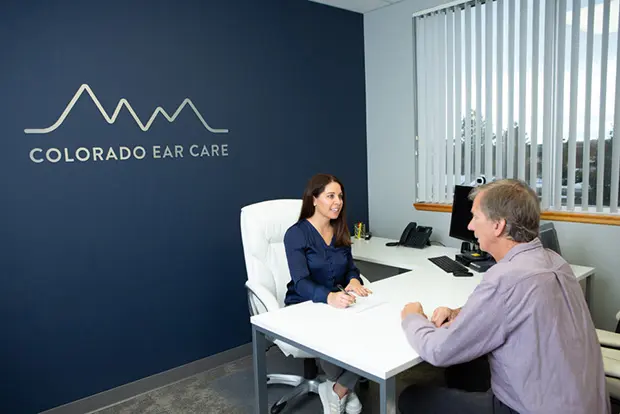Is it safe to wear hearing aids in the water?
“Are my hearing aids waterproof?” is near the top of the list of questions that new hearing aid wearers ask in our practice.
In no uncertain terms, we are here to tell you that no, most of today’s hearing aids are not waterproof. In fact, unless you wear a very specific type of hearing aid, such as Phonak’s Audéo™Lumity device, your technology can suffer significant, irreparable damage when submerged in water.
So when you’re participating in activities like swimming, showering, bathing, hot tubbing, getting your hair done — basically any water-rich environment — you should remove your hearing aids.
It is also recommended that you take out your hearing aids before applying sunscreen and/or lotion, putting on perfume or cologne, or products like hair spray.
Though these products may not contain the same amount of moisture as water, they can still cause similar damage, or they can create significant build up on your devices, which can cause damage to their electronics or prevent an optimal performance.
How exactly do water and other liquids damage hearing aids?
When an abundance of water, moisture, and other liquids come in contact with your hearing technology, it can make its way inside the devices, causing corrosion, which in turn causes the electronics to malfunction.
This corrosion can also make your hearing aid batteries inoperable, and even cause blockage within the device, decreasing your technology’s overall volume.
Aren’t hydrophobic hearing aids waterproof?
When researching different types of hearing aids, you may have run across the term “hydrophobic” and wondered what exactly it is referring to.
Essentially, what “hydrophobic hearing aids” or “hearing aids with a hydrophobic coating” mean are hearing aids that feature a water-resistant barrier. Typically, this barrier is a very thin nano-coating that covers the devices.
While this does represent an advancement in hearing aids, it’s not a fully waterproof solution for this technology.
While this water-resistant barrier is good for protecting your hearing aids from everyday encounters with moisture — like sweating, for instance — it only offers so much protection. This barrier is not capable of protecting your technology if it’s been fully submerged in water.
What about oleophobic? What does that mean?
Its purpose is very similar to that of hydrophobic coatings on hearing aids, but instead of repelling water and other moisture, these materials are designed to repel oils from attaching themselves to your hearing aids.
Sweat, natural oils from the body, and earwax are some of the most common ways in which hearing aids can become dirty, damaged, and perform below expectations.
So while these nano-coatings can go a long way in protecting your devices, they aren’t yet capable of doing the entire job on their own.
So what do I do if my hearing aids get wet?
- First, we don’t want you to panic. Yes, there may be damage, depending on the severity of the soaking your hearing aids received, but not all hope is lost. There are some things you can do in order to alleviate some of the harm to your devices.
- How wet did your hearing aids get? Did you simply get splashed with a little water, or did they get fully submerged for a long period of time? This will often make a big difference in the potential damage.
- Regardless, remove them from the situation, and if they’re battery powered devices (meaning non-rechargeable), open the battery door, remove the battery, tap out any excess water, gently absorb whatever moisture you can with a soft cloth both inside and outside of the device, and make sure to dispose of the battery.
- If your devices are rechargeable, carefully shake out any excess moisture that you can, and then proceed to the next step.
- Now, if you have one, place your device in a hearing aid dehumidifier. Sometimes, these are also called hearing aid drying jars, or hearing aid dryers. Typically, they’re used at night to clean and dehumidify devices after a day’s use, but can also be used in situations like these to pull out excess moisture and hopefully alleviate damage to your hearing aids’ electronics.
- Let your hearing aids dry overnight.
- After your hearing aids have dried overnight, power them up to see if they’re functional.
Even if you are able to power your aids and they appear to be in good working order — and we hope they are! — we recommend booking an appointment so that one of our technicians can take a closer look at your hearing aids.
And depending on how recently you purchased your hearing devices (or if you purchased an extended warranty for your aids), you might be covered for certain aspects of the damage.
The only way to know for certain is to work with a professional who can assist you with the process.
So, are hearing aids waterproof? With rare exceptions, no. But thanks to advancements in hydrophobic and oleophobic technologies, your devices are protected from everyday interactions with sweat, body oils, and the like.
In the instance that your devices develop excessive buildup from sweat, oils, and earwax, we can assist you with professional cleaning for your devices, as well as show you an array of accessories for your hearing aids that can help you keep them clean and moisture-free in between your regular appointments.
Ready to learn more? Contact us today so you can speak with one of our hearing care professionals.

